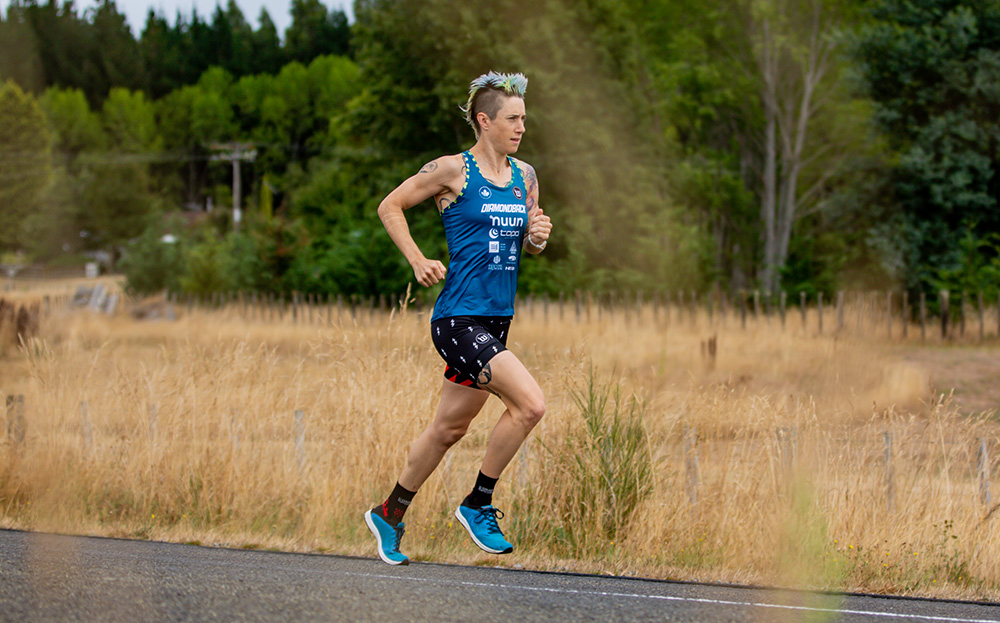In the spirit of Pride Month , Topo Elite Athlete Rach McBride shares with us their experience of identifying as non-binary, not only in the world as a whole, but especially in the very binary world of sport.
Rach McBride (they/ them) is a 42-year-old professional triathlete from Vancouver, BC. They have been racing triathlon for over a decade, with a brief stint in bike racing and a number of missed races due to injuries along the way. Yet broken bones and gnarly crashes have yet to stop or even slow Rach down. Known as “the most interesting [person] in triathlon”, with two master’s degrees, a former life as a touring cellist and punk rocker, currently with a side hustle working for Options for Sexual Health, this multi-faceted human is as unique as they come.

You have been so courageous in sharing who you are and who you know to be your true self, yet you are living and racing in an incredibly binary world. How does this feel?
I have felt different for as long as I can remember. I spent much of my childhood and adult life confused as to how to fit in. Gendered spaces have been often challenging for me to navigate, like being told I’m in the wrong washroom or asked if I’m “a boy or a girl” by adults and children alike. I learned about gender identity outside of the binary when I entered university and quickly identified as genderqueer. It helped me turn from being angry when someone was confused by my gender to being more amused and proud that I was challenging their binary ideas.
Once I found sport, I didn’t feel like that part of me fit, because sport is of course very binary. I felt pressure to be feminine, to stand up proudly as a “woman” in sport and encourage others to do the same. This never felt authentic. Yes, I have a female body, I compete in the female category, and I would love to see more female-bodied athletes participating in endurance sport. However, terms like “woman/lady/girl” don’t fit me. Every time I step up to a start line or any gendered space, I feel out of place, like a misfit or an ogre. Being true to my non-binary self recently has allowed me to put a name to that misfit-ness that I feel. Embracing my identity outside the binary has been incredibly liberating.
Specifically, in a sport like triathlon/Ironman, how do you think the organizing committees can do better to be more inclusive?
I’ve become increasingly aware of unnecessary gendered spaces, especially in sport. Race organizers can do a lot to be more inclusive by looking at these gendered spaces. Registration forms are a place where often someone is forced to choose between F and M. Especially now, when international government documents are allowing for an X identity, this seems truly out-dated. In my opinion, the most inclusive way to navigate this is to leave a blank space for folks to fill in their gender and then mark which race category they would prefer to compete in, e.g. “female” or “male” categories. It was really neat to experience this at a local gravel race last year. I truly felt recognized and seen. It felt like a safe space to go and compete.
Additionally, races can organize other gendered spaces like bathrooms and change rooms differently. One of my biggest pet peeves is seeing gendered port-a-potties or single occupancy bathrooms. There is simply no need. Having gendered change rooms is of course necessary, but including either a neutral change space (so a person doesn’t have to “choose a side” if they don’t feel comfortable doing so, or provide single occupancy change spaces within gendered change tents for people who would prefer a more private space (for whatever reason, really).
Language is also a huge way that races can create a more inclusive space. There are many instances where gendered language is simply not necessary. Using “people”, “folks”, “friends”, or “humans” when addressing crowds, instead of the binary “ladies and gentlemen” or “men and women”. Often groups of people who may appear of the same gender are addressed as “ladies”, “girls”, “guys” etc. An assumption is made of the collective gender identity. When I’m included in something like this, I feel pretty uncomfortable. Using non-gendered language can help people like me feel more included.
What topic do you think is most important that we elevate and talk about this year?
Inclusivity continues to be an incredibly important topic in sport. There is a huge amount of work that needs to be done to create a more inclusive space and encourage more people to participate in sport. This goes beyond gender. This includes all those whom we see as minorities in sport – people of colour, trans folk, all body shapes/sizes/colours/abilities, socio-economic ranges, family/relationship compositions, sexualities. There are many ways that we can create more inclusive spaces in sport for all people by being aware of barriers, assumptions, and language.
Who is leading a conversation you are passionate about right now?
Chris Mosier – first openly transgender male athlete to ever compete in an Olympic trial alongside other men
Rain Dove – American model, actor, and activist, best known for their work in subversive fashion, as a gender-nonconforming model
A big thank you to Rach for opening up and sharing their experience and thoughts with us and our community! We’re so proud to have them as part of the Topo family! If you’d like to keep up with Rach, you can follow them on Instagram at @rachelmcb.